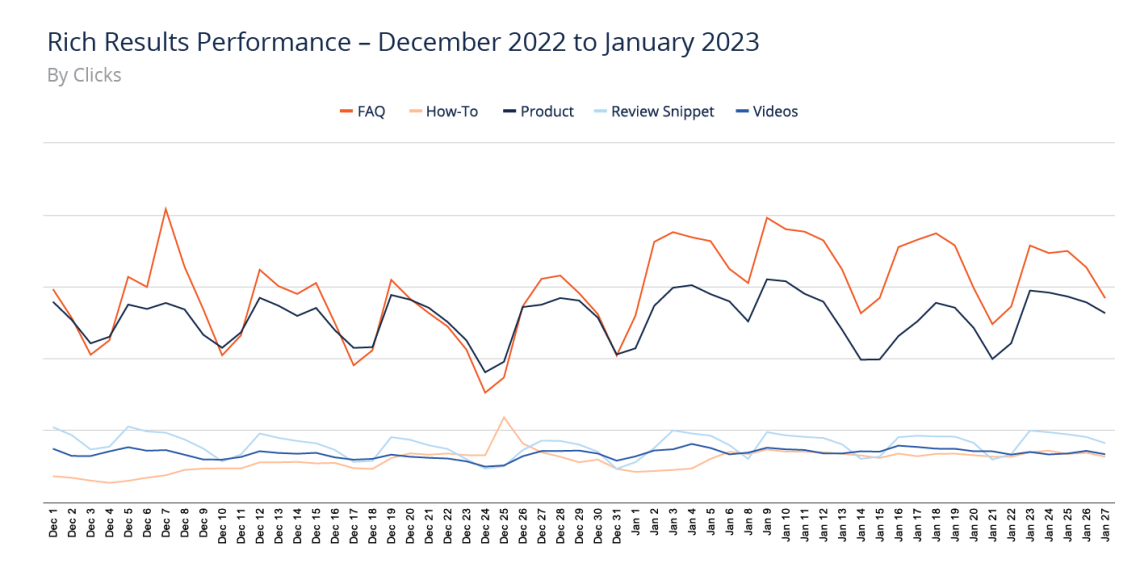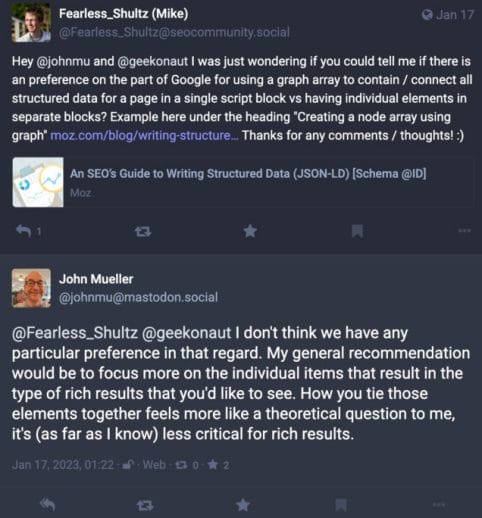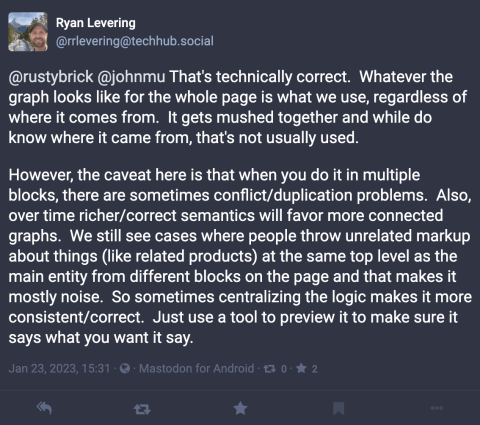December 2022 started with a series of updates from Google resulting in fluctuations in performance on the search engine result page on a global scale. Thankfully, we were able to leave all the negative energy in 2022 and start the new year with renewed performance.
This January, we’ve seen December’s fluctuations turn into a steady rhythm of growth. There were also discussions about Google’s perspective on connected structured data. Here’s a roundup of what we’ve seen this past January.
Rich Results Performance in January 2023
Steady performance across all rich results
January was a fairly calm month on the search engine results page – a welcomed change from the second half of 2022.

According to our data from Schema Performance Analytics, most rich results were trending positively in January in comparison to December.
FAQ Recovery from December Update
In December 2022, we saw the performance for FAQ rich results take a slight decline.
This is likely due to the rollout of Google’s December Helpful Content Update and link spam update, which affected rankings and traffic to many websites as observed by other SEOs.
The Google search ranking algorithm volatility is still pretty hot, right before Christmas https://t.co/plitzoaipq pic.twitter.com/HWgLMFlxhI
— Barry Schwartz (@rustybrick) December 23, 2022
Thankfully, the updates ended officially in January and we’ve seen the numbers recover and stabilize for the rest of the month.
Connected vs. Unconnected Structured Data
This January, there was a conversation with John Mueller about whether Google had an SEO preference for connected structured data on Mastodon.
While John said that Google has no preference, Ryan Levering, who primarily works on structured data at Google, agreed to John’s response but with a caveat on Mastodon.
Here’s our takeaway from this discussion.
Google cares about Schema Drift.
In Levering’s response, he said,
However, the caveat here is that when you do [structured data] in multiple blocks, there are sometimes conflict/duplication problems… We still see cases, where people throw unrelated markup about things (like related products) at the same top level as the main entity from different blocks on the page and that, makes it mostly noise.”
The duplication issue is also known as Schema Drift and happens when the structured data is out of sync with the content on your website.
During the “Structured Data: What’s it all about?” episode of Google’s Search off the Record Podcast, Levering mentioned that their primary challenge with structured data is “figur[ing] out a way to verify that the structured data is accurate”.
The challenge of verifying the accuracy of structured data is costly to Google, “so sometimes centralizing the logic makes it more consistent/correct,” said Levering. Keeping the structured data organized can reduce the risk of Schema Drift and this aligns with how we do structured data at Schema App.
The Schema App Highlighter dynamically generates structured data from the content on your website. If your team changes the content on the page, your structured data will automatically update to reflect those changes.
Connected structured data might not matter as much to Google today but it will in the future.
Also, over time richer/correct semantics will favour more connected graphs.”
During the podcast, Levering also spoke about how machine learning can use structured data as a data source. If machine learning uses structured data to validate or understand the content, connected structured data will teach the machine to infer the meaning and connections between different entities on the site.
Even though Google doesn’t utilize connected structured data today, they are likely headed in that direction in the future. However, creating connected structured data can be complicated and hard to manage.
At Schema App, we do more than just achieve rich results through structured data. We help our customers create their own knowledge graph and connect it with other knowledge graphs available on the web.
With our background in semantic technology, our goal is to support our users’ SEO goals while also connecting their domains with the people, places, things and concepts that have been described by other authorities like Wikipedia, Wikidata, and Google’s Knowledge Graph. In engaging with Schema App, you are leveraging a global collective intelligence and transforming your data into knowledge.
Connected Schema Markup is essential to this work. That’s why we developed the Schema Paths Tool, to help users connect different schema types and determine the path that best articulates the relationships in their web content.
Conclusion
Rich results are merely the tip of the structured data iceberg.
At its most basic level, structured data increases search engines’ understanding of your content, which corresponds to an increase in traffic and engagement to your site. At an advanced level, structured data provides search engines with context to the contents on your page, which transforms data into knowledge for future applications.
If you are interested in generating connected structured data, we can help. Get in touch with us today to learn more about our solutions.

Martha van Berkel is the co-founder and CEO of Schema App, an end-to-end Semantic Schema Markup solution provider based in Ontario, Canada. She focuses on helping SEO teams globally understand the value of Schema Markup and how they can leverage Schema Markup to grow search performance and develop a reusable content knowledge graph that drives innovation. Before starting Schema App, Martha was a Senior Manager responsible for online support tools at Cisco. She is a Mom of two energetic kids, loves to row, and drinks bulletproof coffee.



